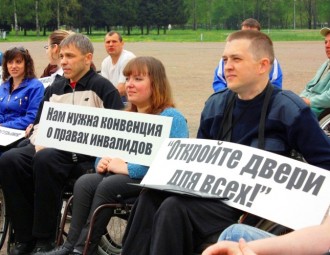Belarus to join UN Convention on Rights of Persons with Disabilities

Now the state has officially committed itself to provide full participation in civic, political, economic, social, and cultural life of the society for the disabled.
The UN Convention on the Rights of Persons with Disabilities was adopted on 13 December 2006 and came into force on 3 May 2008, but Belarus has officially supported its provisions only today.
Belarus will sign the UN Convention on the Rights of Persons with Disabilities soon, UN Resident Coordinator/UNDP Resident Representative in Belarus Sanaka Samarasinha, BelTA reports her words.
“Belarus will sign the convention in a couple of days. This will be a huge leap forward, given that Belarus will be the last European country to join it,” Sanaka Samarasinha explained.
As “EuroBelarus” Information Service informed earlier, among the main principles one should follow there are: respect for inherent dignity, individual autonomy including the freedom to make one’s own choices, and independence of persons; non-discrimination; full and effective participation and inclusion in society; respect for difference and acceptance of persons with disabilities as part of human diversity and humanity; equality of opportunity; accessibility; equality between men and women; respect for the evolving capacities of children with disabilities and respect for the right of children with disabilities to preserve their identities.
-
03.01
-
07.10
-
22.09
-
17.08
-
12.08
-
30.09



























